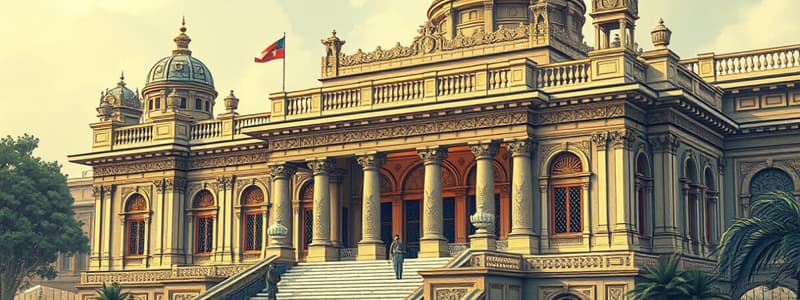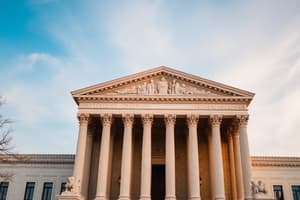Podcast
Questions and Answers
What are the primary functions of the judiciary in India?
What are the primary functions of the judiciary in India?
The primary functions of the judiciary in India are to interpret laws, punish law violators, and protect citizens' rights.
What is the highest court in the Indian judiciary and where is it located?
What is the highest court in the Indian judiciary and where is it located?
The highest court in the Indian judiciary is the Supreme Court, located in Delhi.
How many judges, including the chief justice, make up the Supreme Court?
How many judges, including the chief justice, make up the Supreme Court?
The Supreme Court consists of the chief justice and 30 other judges.
What are the qualifications required to be a judge of the Supreme Court?
What are the qualifications required to be a judge of the Supreme Court?
What is the term of office for judges of the Supreme Court, and under what conditions can they be removed?
What is the term of office for judges of the Supreme Court, and under what conditions can they be removed?
What are the three types of jurisdiction held by the Supreme Court?
What are the three types of jurisdiction held by the Supreme Court?
What does original jurisdiction in the context of the Supreme Court imply?
What does original jurisdiction in the context of the Supreme Court imply?
What is the role of the president in the appointment of judges to the Supreme Court?
What is the role of the president in the appointment of judges to the Supreme Court?
What is the advisory jurisdiction of the Supreme Court of India?
What is the advisory jurisdiction of the Supreme Court of India?
Define judicial review in the context of the Indian judiciary.
Define judicial review in the context of the Indian judiciary.
What is a court of record and why is it significant?
What is a court of record and why is it significant?
Explain the writ of habeas corpus.
Explain the writ of habeas corpus.
What role does the High Court play in the Indian judiciary?
What role does the High Court play in the Indian judiciary?
What qualifications must one have to become a judge of the High Court in India?
What qualifications must one have to become a judge of the High Court in India?
What is the term limit for a High Court judge in India?
What is the term limit for a High Court judge in India?
How do subordinate courts function within the Indian judiciary?
How do subordinate courts function within the Indian judiciary?
What power does the High Court have over lower courts?
What power does the High Court have over lower courts?
What is a writ of mandamus?
What is a writ of mandamus?
Flashcards are hidden until you start studying
Study Notes
Overview of the Judiciary
- The judiciary is the third branch of the government, responsible for interpreting laws, punishing law violators, and protecting citizens' rights.
- India's judiciary is divided into three levels: Supreme Court, High Courts, and Subordinate Courts.
The Supreme Court
- The Supreme Court is the highest court in India, located in Delhi, and serves as the central government's judiciary branch.
- Chief Justice and 30 other judges compose the Supreme Court; the president appoints them based on the Council of Ministers' advice.
- Qualifications for a Supreme Court judge include being an Indian citizen, having served as a High Court judge for five years, having at least ten years of experience as an advocate, or being a distinguished jurist.
Terms of Office
- Supreme Court judges serve until they reach 65 years of age; they cannot be removed by the president without a two-thirds majority vote in Parliament.
- Impeachment of a Supreme Court judge requires proof of misbehaviour or incapacity.
Jurisdiction
- Jurisdiction types: original (hearing cases for the first time), appellate (reviewing cases from High Courts), and advisory (offering legal opinions to the president).
- The Supreme Court has exclusive original jurisdiction over disputes between states and cases involving societal importance.
Judicial Review
- The Supreme Court possesses the power of judicial review, allowing it to declare laws or orders void if they conflict with the Constitution.
Court of Record
- Operates as a court of record; maintains a permanent record of judicial proceedings.
- Rulings set precedents for other courts and include powers to fine and imprison for contempt.
Writs
- Empowered to issue various writs, including:
- Habeas Corpus: Protects against illegal detention, enabling the court to order a detainee's release.
- Mandamus: Commands public authorities to fulfill their duties when they fail to act.
Legal Authority
- The Supreme Court's decisions are final and binding on all lower courts, ensuring uniformity in legal interpretations across India.
- Exemption exists for laws pertaining to armed forces.
The High Court
- The High Court supervises the judicial system at the state level, led by a chief justice and judges appointed by the president with consultation from the chief justice of the Supreme Court and the state governor.
- High Court judges must either hold a previous judicial office or have ten years' experience as advocates.
Terms of Office in High Courts
- High Court judges serve until the age of 62, with provisions for resignation or removal by the president.
- Judges can be transferred between courts or appointed to the Supreme Court.
Functions of the High Court
- Authorized to issue writs and protect citizens' Fundamental Rights.
- Oversees Subordinate Courts, ensuring proper record-keeping and the handling of significant legal matters.
Subordinate Courts
- Comprise District and Sessions Courts, Provincial Courts, and Nyaya Panchayats.
- District judges are appointed by the governor in consultation with the High Court.
- Address civil and criminal cases, with uniform structures and functions across the country, supervised by state High Courts.
Studying That Suits You
Use AI to generate personalized quizzes and flashcards to suit your learning preferences.




